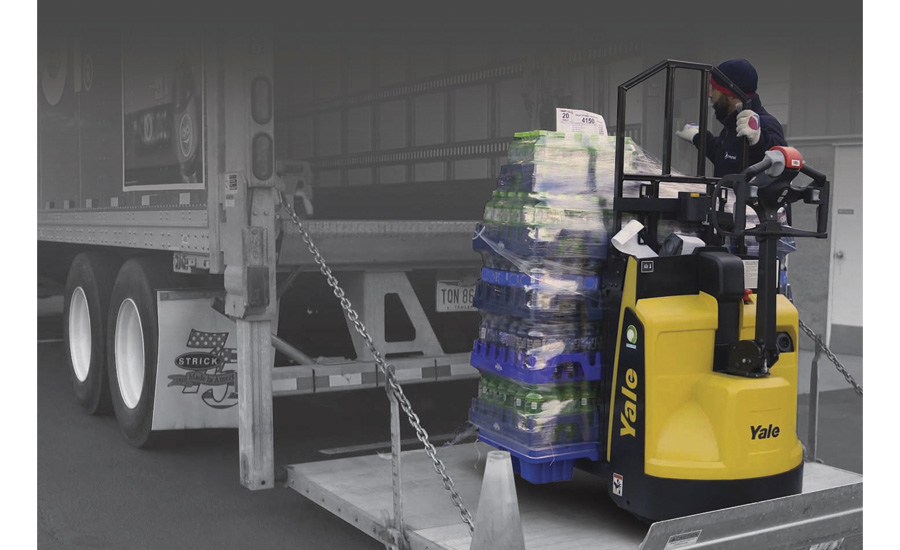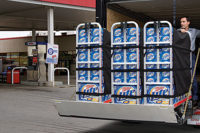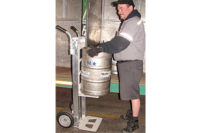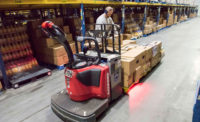To stay on top of SKU proliferation, beverage delivery personnel now are tasked with larger, more frequent deliveries. In turn, warehouse and distribution employers are implementing material handling equipment and system solutions to better handle their direct-store-delivery (DSD) customers. Through ergonomically designed carts and hand trucks, suppliers are helping to make DSD safer and more efficient.
“Operations need delivery personnel to stay productive all shift long,” says Shelley Bell, marketing manager for Greenville, N.C.-based Yale Materials Handling Corp. “From an equipment standpoint, this requires ergonomic features to keep operators fresh and focused, and a user-friendly power source that doesn’t derail delivery schedules. Some ergonomic enhancements include mid-mounted control handles designed to balance the constraints of steer effort, visibility and maneuverability; larger handle run zones; easily accessible controls; and turntable bearings and rubber tires to reduce the force required to turn and steer.”
Yale recently added a DSD package for its MPB045VG walkie pallet truck. The ergonomic design of the handle allows for easy maneuverability in stores and on liftgates by allowing the operator to stand beside the truck with a one-hand throttle activation and full visibility of the truck from end-to-end, Bell explains.
Mike Ludka, senior product manager at Oconomowoc, Wis.-based ORBIS Corp., also highlights the importance of ergonomics within carts and hand trucks. “Beverage delivery can be heavy and physically demanding,” he explains. “With labor shortages increasing in the industry, keeping delivery personnel safe is top-of-mind. To increase safety during beverage handling and delivery, beverages must be secure and material handling products ergonomic. Retail-ready merchandising solutions that offer secure product placement limits the amount of physical labor required during delivery. When bulk merchandising systems can be wheeled from the truck to the retail aisle, cooler or backroom without down-stacking, delivery personnel experience a safer, less-demanding delivery.”
To help make bulk merchandising easier, ORBIS recently launched its XpressBulk merchandising system for the beverage industry. The XpressBulk system is a fully reusable, retail-ready system designed for retail deliveries that transports materials with one touchpoint, Ludka says. The system is comprised of a plastic dolly, removable handle and plastic trays that are contoured to specific bottle designs making it beneficial for delivery personnel and retail associates, helping them save time and physical labor, he adds.
A shortage of drivers, increased productivity, and a focus on safety and ergonomics all play into developing material handling solutions that benefit the beverage industry, says Paul Adler, director of marketing at Standish, Mich.-based Magline Inc. Understanding the use and application for a specific segment of users is important in developing or configuring a cart or hand truck that provides the safest and most ergonomic design to assist the material handler, he adds.
Also designed for bulk material handling is the Magline LiftPlus Lite. The LiftPlus Lite is designed to increase delivery personnel productivity, support diverse loading requirements and reduce job-related injuries, the company says.
“The goal with Magliner products is to reduce the amount of lifting, bending, twisting and pushing, which in turn will reduce the risk of injury on the job,” Adler says. “This also improves job satisfaction and positively impacts the bottom line of the company by reducing costs associated with workplace injuries and employee turnover.”
Durable solutions
As delivery personnel look for solutions to better assist with DSD and SKU proliferation, warehouses are beginning to turn away from the traditional, bulky hand truck. “Traditional hand trucks have been widely used, but they are too large to accommodate bulk cased deliveries to brick-and-mortar stores,” ORBIS’ Ludka says. “This is an inefficient process for the new retail world because it requires multiple touches, consuming significant time and resources. To alleviate this pain point, small-format mobile pallets and retail-ready bulk merchandising solutions are entering the market.
“These solutions reduce the manual labor needed to downstack and transfer heavy beverages to other systems because materials can be unloaded from the truck and moved to the aisle in a more fluid sequence,” Ludka says.
Hand trucks are tools, or an extension of a worker, Magline’s Adler says. Quality, durable products reduce downtime and therefore increase productivity, he adds. Higher quality products can cost more up front, but in the long run, provide more overall value, Adler highlights.
Load stability also is an important feature when choosing durable material handling solutions, Yale’s Bell notes. “The size, shape and weight of various products and packaging have a great effect on load stability,” she says. “As a result, pallet trucks can be offered with a variety of features meant to enhance load stability — an especially important concern considering the uneven terrain beverage delivery drivers often face when unloading pallets on-site.”
Durability and ease of repair is another important feature in material handling equipment, Bell adds. “Without durability and easy maintenance, pallet jacks can significantly stress operations,” she says. “Supply chains operate on a tight schedule with little tolerance for downtime. Sending drivers back home to base for repair, a replacement truck or new battery packs runs counter to the need for on-time, efficient movement.”
To help operations running reliably, telemetry systems are designed to monitor needed maintenance requirements of hand trucks, Bell says. Telemetry systems like Yale Vision can provide operators with service notifications, which can prevent minor issues that might not be readily apparent to operators. For instance, the system pinpoints a loss of hydraulic pressure or slight controller damage, thereby preventing minor issues from escalating into more serious problems that could result in crippling downtime and costly repairs, she adds.
ORBIS’ Ludka also highlights the importance of durability and an easy-to-repair solution for carts and hand trucks. “Durability and ease of repair start with the design [and] if done correctly, repairability becomes a benefit, not a burden,” he says. “Depending on how product components are attached, repair can easily be done on-site, without third-party services or long service delays.
“ORBIS, for example, went from using typical bolts and nuts in its mobile pallets to using specialized fasteners,” he explains. “These fasteners are easily accessible and allow for hassle-free repairs. More carts and hand trucks are likely to feature innovative designs to reduce repair pain-points for customers, and to extend product life.”
Magline’s Adler adds that developing equipment that is modular in design will allow for easy and cost-effective repairs, which provides additional value and reduces downtime.
Looking ahead, SKU proliferation will continue to be a transformative force across distribution operations and it is important to implement equipment that will support each phase of the delivery cycle, experts say.
As the demand for recruiting and retaining employees in the beverage delivery industry remains high, developing material handling equipment that improves productivity and supports safety and ergonomic initiatives is critical, Magline’s Adler says.
As the carts and hand trucks market evolves, ORBIS’ Ludka notes that the traditional products will continue to have a place in retail delivery. However, as more retailers shift store footprints and merchandising strategies with new market dynamics, the need for varying types of equipment likely will see reductions. As a result, more cart and hand truck manufacturers likely will adopt more all-in-one strategies for their product designs, allowing delivery and merchandising to become a more seamless process at retail, he says. BI




